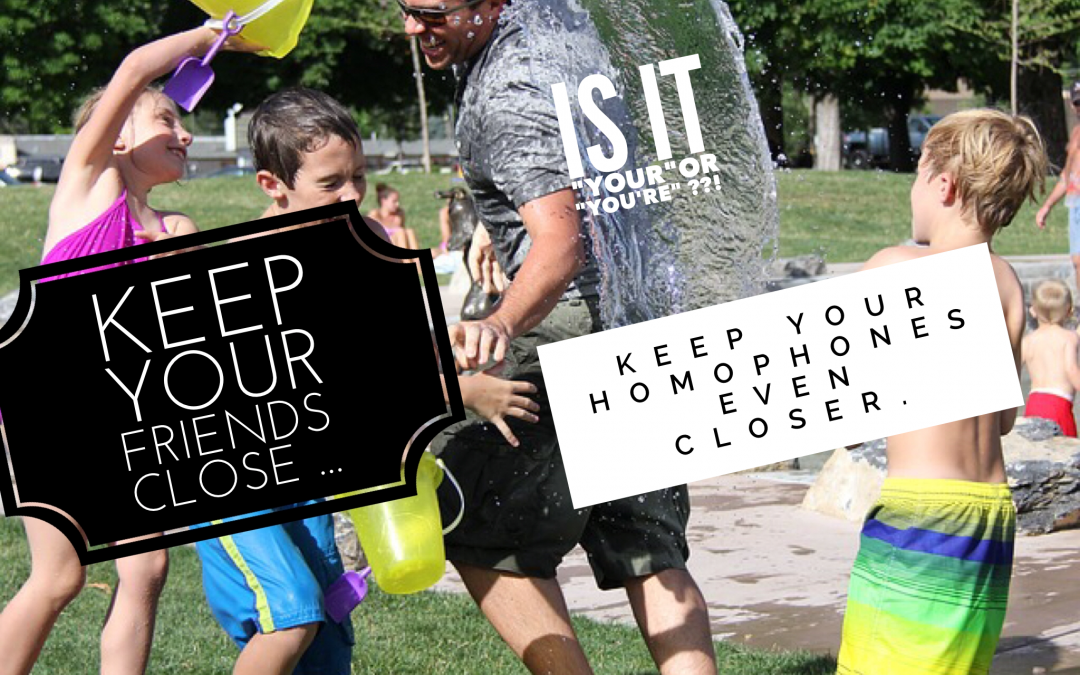Homophones can wreak havoc with your writing. These days, you can instantly search definitions of words. Without that capability, you might say things like:

Or [carnival music]
Let’s play, SPOT THE WRONG WORD:
Miracle Max: You got any money?
Inigo Montoya: Sixty-five.
Miracle Max: I’ve never worked for so little. Except once, and that was a very noble cause.
Inigo Montoya: This is noble, sir. His wife is… crippled. His children are on the brink of starvation.
Miracle Max: Are you a rotten lyre!
Inigo Montoya: I need him to help avenge my father, murdered these twenty years.
Miracle Max: Your first story was better.
You know you found it. Lyre = a musical instrument, like a harp. What Miracle Max wanted to say was [duh-oh], “Are you a rotten liar!”
How to keep your homophones close
What does Homo mean? Same.
And Phone? Sound.
So, Homo + phone = Same Sound.
Oh great. As in Cheryl/Sherril/Sheryl. In the case of someone’s name, they will just spell it out for you (perhaps coupled with a choice facial expression depending on how they feel about their parents’ calling them that in the first place).
But when someone is reading your post, NOBODY is going to save you from the embarrassment of making a homophone gaffe.
Teachable moment: What would have been wrong if I had used the same-sounding word ‘gaff’ in the previous sentence? I would have been talking about a barbed spear, for landing large fish rather than what I meant, which was to illustrate a mistake made in a social situation.
The greatest imposters
What are the easiest ones to confuse? Here are some that everyone agrees upon:
(And clicking on each word will take you to its definition.)
Faze/Phase (as a noun rather than intransitive verb)
Flew/Flu/Flue (actually two noun meanings and an adjective meaning)
Pour/Pore (Each of these is both a verb and a noun)
Here’s a great little article if you’re still having trouble with this threesome!
And finally, the subject of today’s featured image:
Here are two sites with lists of homophones: First site AND Second site.
Yet, depending on how you pronounce English words (your accent), they don’t all apply! Here’s a site for British-English pronunciation.
Test yourself. Look at the two or three words side by side and see if you can come up with a definition for each one.
If one is unclear, it’s worth looking up its definition and learning the less familiar word well.
This last example is NOT a homophone, however, because a lot of people speak spectacularly fast or don’t enunciate clearly, some people write this out incorrectly:
Should have/should of
There is no such thing as “should of”. You hear “should’ve” (a contraction of should and have), but “should of” doesn’t translate into any language. Ban it from your writing!
Parting Homophone Shot
This sort of fits the rule … loosely. Their names all sound the same: BOND … James Bond. However, like homophones, they look different, would you not agree?

But don’t bother with a dictionary. Speak to their bartender.
 Kate Casper is a writer, teacher and copyeditor who would love to help you with your writing. Follow her lead to receive Weekly Writing Tips and inspiration. Polish your writing and marketing skills, and earn money as you grow. KateCasper.com
Kate Casper is a writer, teacher and copyeditor who would love to help you with your writing. Follow her lead to receive Weekly Writing Tips and inspiration. Polish your writing and marketing skills, and earn money as you grow. KateCasper.com




Hi
As a former English teacher, I have to commend you
for a very entertaining and informative post. I really
enjoyed it.
I’m so glad you enjoyed it. It is fun to write about irregularities and inconsistencies in the English language and add some humour where possible.
He taught me — keep your friends close but your enemies closer .” Why should I keep my enemies close ? How do friends become enemies? My close friend is becoming closer now days to my roommate.
Yes, that’s the original phrase! They say to keep your enemies close so that you can stay a step ahead of any trouble they may cause. If you have a ‘close’ friend who is doing things behind your back…poor you! Stay safe!